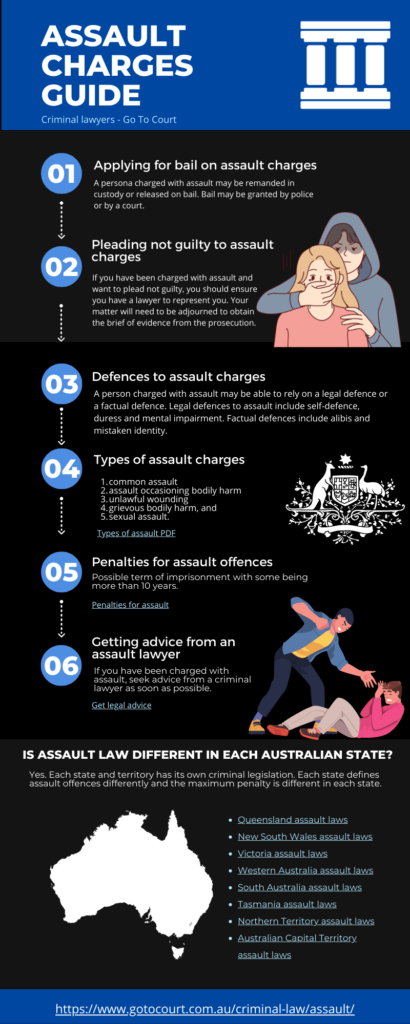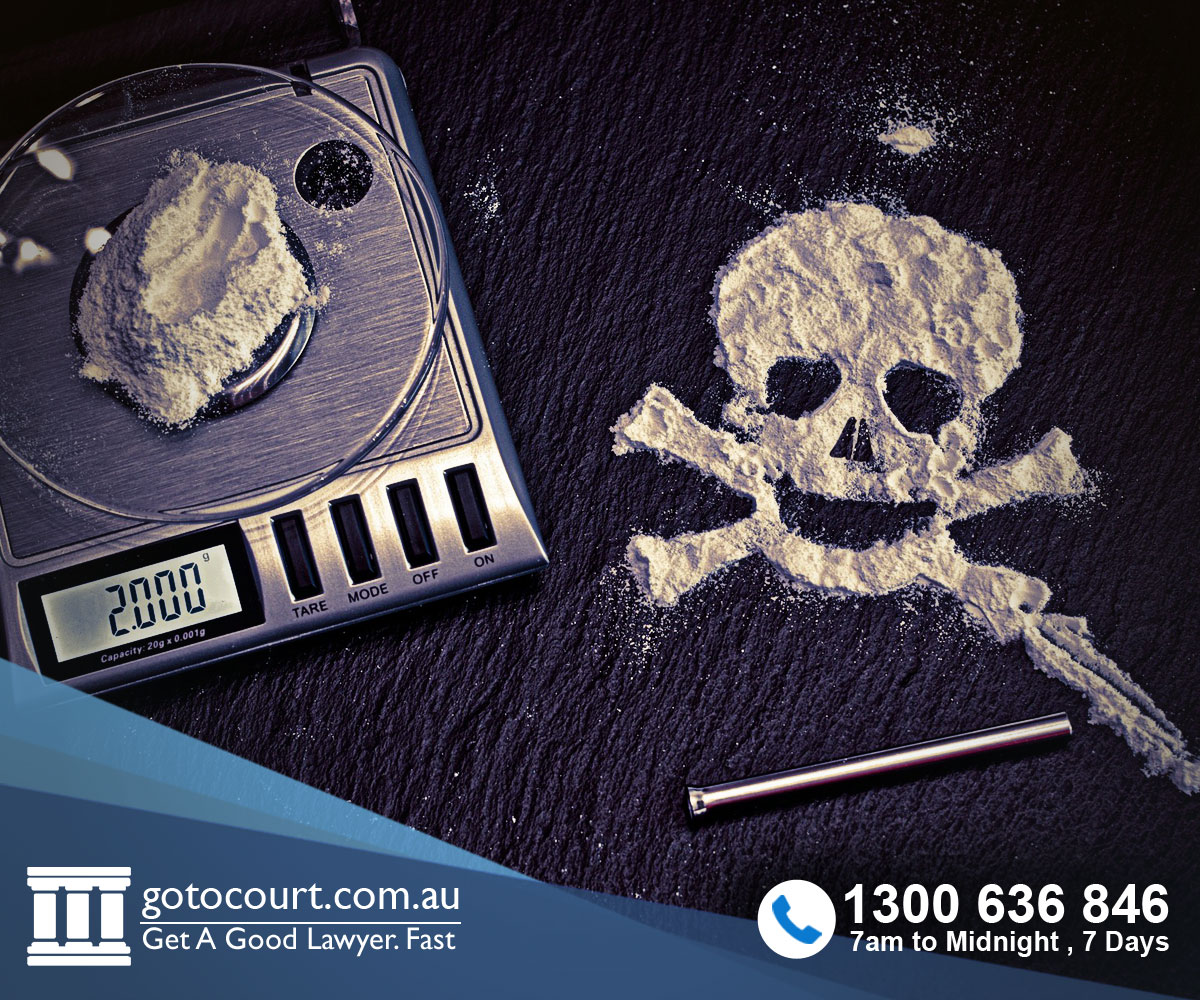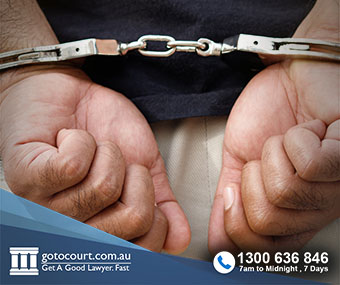Assault Charges in Australia
All Australian jurisdictions have a range of assault offences, ranging from common assault to more serious indictable offences like causing grievous bodily harm. This page deals with what to do if you have been charged with an assault offence.

Applying for bail on assault charges
A person charged with assault may be remanded in custody or released on bail. Bail may be granted by police or by a court. Courts decide whether to grant bail based on whether the person would be a risk to the community if they were released, and whether that risk could be mitigated by imposing bail conditions.
When bail is granted, conditions that may be imposed include:
- to live at a specified address
- to report to the local police at specified times
- not to consume alcohol or drugs
- not to contact certain people such as alleged victims
- to participate in rehabilitation programs
Pleading guilty to assault charges
If you have been charged with assault and want to plead guilty, you should first review the charges and allegations carefully. It is important to make sure you are actually guilty of the offence you have been charged with and that you accept the police summary of the facts. You should also consider whether there are any legal defences available to you.
If you are pleading guilty to assault, it may be in your interests to adjourn the matter to gather supporting material such as character references. If you are pleading guilty to an assault where drugs or alcohol were a factor, you may want to consider completing a rehabilitation program before finalising the charges. The court could then be asked to take this into account at sentencing.
Pleading not guilty to assault charges
If you have been charged with assault and want to plead not guilty, you should ensure you have a lawyer to represent you. Your matter will need to be adjourned to obtain the brief of evidence from the prosecution. It will then have to go through other procedural stages, which differ from state to state, before proceeding to a contested hearing.
At the contested hearing, the court will hear evidence from the prosecution. The defence will then have the opportunity to call witnesses as well. Both parties will make submissions and the court will then make a decision as to whether the accused has been proven guilty.
If they are found guilty, a sentence will be imposed.
Defences to assault charges
A person charged with assault may be able to rely on a legal defence or a factual defence.
Legal defences to assault include self-defence, duress and mental impairment. The defence of self-defence applies when the act was done while defending oneself or another person. The defence of duress applies when a person was essentially ’forced’ to commit an act by another person. The defence of mental impairment applies when the accused was unable to understand or control their actions.
Factual defences include alibis and mistaken identity.
Types of assault
There are five main types of assault charges in Australia. These are:
- common assault
- assault occasioning bodily harm
- unlawful wounding
- grievous bodily harm, and
- sexual assault.
The nature of the offence, the circumstances in which it occurred and the type of injury sustained will determine the charge that is laid. In some circumstances, the identity of the victim will also determine the appropriate charge.
Common assault
Common assault is the most frequent assault charge in Australia, and can result from a simple scuffle or argument. You can be charged with common assault if during an argument you threatened another person, or they received minor injuries from a push, shove, hit, or other contact. Spitting on another person or throwing an object at a person are also classed as common assault.
The penalty for a common assault will differ according to factors such as the state or territory in which it occurs, its severity, the extent of any harm, and the past criminal history of the offender.
Assault occasioning bodily harm
An assault occasioning bodily harm charge arises when the person who is attacked suffers an injury, such as bruising or swelling. Generally, the injury will be one which is severe enough to require medical treatment or time off work.
If the offence involved the use of a weapon, or the threat of a weapon, then the charge can be upgraded to aggravated assault occasioning bodily harm.
Unlawful wounding
If the assault caused the breaking or penetration of the skin which normally results in bleeding then you may be charged with unlawful wounding. If the outer skin is broken, but the injury hasn’t penetrated through the outer layer, then this cannot be classed as unlawful wounding. Normally medical evidence would be provided of the injury sustained to justify the charge.
Grievous bodily harm
Grievous bodily harm is a very serious form of assault which arises when the person attacked loses a distinct part of an organ, or suffers serious disfigurement or an injury that if left untreated would endanger the person’s life or cause permanent injury. This can include broken teeth or bones through to more life endangering injuries such as a head injury or severe internal bleeding.
Serious assault
A serious assault charge occurs when a public officer or police office is assaulted in the line of duty. A public officer includes a transit officer, health service employee, correctional officer, or a child protection officer.
The charge may arise in circumstances including where a person bites or spits on the officer, or pretends to be armed with a dangerous weapon. The charge can also result from assaulting a person who relies on a guide, hearing or assistant dog, is in a wheelchair, or is over 60 years of age.
Sexual assault
A sexual assault occurs when someone is touched inappropriately, forces someone to commit an act of gross indecency, or forces someone to witness an act of gross indecency. Gross indecency is an act which doesn’t result in penetration, such as watching someone masturbate, or forcing someone to touch their genitals.
Rape is the most serious form of sexual assault in which intercourse occurs without consent. Aggravated sexual assault occurs when a weapon is used, or threatened to be used, during the offence.
Penalties for assault offences
The penalties for the various types of offences vary depending on the nature of the offence and the offender’s criminal history. However, all carry a possible term of imprisonment with some being more than 10 years. The length of imprisonment varies between the different states and territories in Australia.
Other sentencing options are available for some assault offences such as fines, good behaviour bonds, probation, community correction orders, or a suspended sentence.
Getting advice from an assault lawyer
If you have been charged with assault, seek advice from a criminal lawyer as soon as possible. They will be able to discuss your prospects of bail, the likely penalty and whether you should contest the charge or plead guilty. If you are pleading guilty, they will be able to advise you of steps you can take to mitigate your offending.
If you require legal advice or representation in any legal matter, please contact Go To Court Lawyers.
Recommended Resources
Criminal Evidence
Competence and Compellability of Witnesses
Evidence Improperly Obtained: Bunning v Cross
What Does “Beyond a Reasonable Doubt” Mean?
What Happens During Cross-Examination?
What Happens During Examination-in-Chief?
Australian Assault Laws By State
Is assault different in each Australian state?
Yes. Each state and territory has its own criminal legislation. Each state defines assault offences differently and the maximum penalty is different in each state. The penalties imposed also vary depending on the nature of the offence and the offender’s criminal history.
All assault offences carry a maximum penalty of imprisonment. In some jurisdictions, mandatory sentencing laws may apply. In a case where mandatory sentencing does not apply, a court may impose a non-custodial sentencing order such as a fine, good behaviour bond, or community correction order.
For more information about assault in a particular state, see below:
Queensland assault laws
The Legislation that governs assault offences differs in each state. In Queensland, the definitions and penalties for assault charges are located in chapters 30 and 32 of the Criminal Code 1899.
New South Wales assault laws
Divisions 6 and 9 of the Crimes Act 1900 govern offences against a person in New South Wales.
Victoria assault laws
In Victoria, section 31 of the Crimes Act 1958 outlines the types of assault offences with which a person can be charged.
Western Australia assault laws
Assault offences in Western Australia are defined in Part V of the Criminal Code 1913.
South Australia assault laws
In South Australia, they are found in Part 3 Division 7 of the Criminal Law Consolidation Act 1935.
Tasmania assault laws
The Criminal Code 1924 in Tasmania sets out assault offences in Parts IV and V.
Northern Territory assault laws
The Criminal Code of the Northern Territory sets them out in Part VI, Division 5.
Australian Capital Territory assault laws
In the ACT, assault offences are found in the Crimes Act 1900, Parts 2 and 3.
Legislation Sources
Crimes Act 1900 (NSW) – https://legislation.nsw.gov.au/view/html/inforce/current/act-1900-040
Criminal Code 2002 (ACT) – https://www.legislation.act.gov.au/a/2002-51/
Criminal Code Act 1899 (QLD) – https://www.legislation.qld.gov.au/view/pdf/inforce/current/act-1899-009
Crimes Act 1958 (VIC) – https://www.legislation.vic.gov.au/in-force/acts/crimes-act-1958/294
Criminal Code 1913 (WA) – https://www.legislation.wa.gov.au/legislation/statutes.nsf/main_mrtitle_218_homepage.html
Criminal Code Act 1983 (NT) – https://legislation.nt.gov.au/en/Legislation/CRIMINAL-CODE-ACT-1983
Criminal Law Consolidation Act 1935 (SA) – https://www.legislation.sa.gov.au/LZ/C/A/CRIMINAL%20LAW%20CONSOLIDATION%20ACT%201935.aspx
Police Offences Act 1935 (TAS) – https://www.legislation.tas.gov.au/view/html/inforce/current/act-1935-044
Criminal Code Act 1924 (TAS) – https://www.legislation.tas.gov.au/view/html/inforce/current/act-1924-069

Frequently Asked Question
No, you can represent yourself. However, it is highly recommended to get a lawyer as assault is considered a highly serious charge.
A lawyer will usually charge per hour or a fee for the whole case. Each lawyer usually operates differently so it is an individual preference.
No, you don’t need a lawyer to press assault charges. You can do this by contacting your local police station.
If you are looking to appeal assault charges, it is recommended you speak to a lawyer today to discuss your options moving forward.
In Australia, the punishment for assault can vary based on the severity of the offense. Common assault is a criminal offense that can result in a maximum penalty of two years imprisonment. However, it’s important to note that these severe penalties are typically reserved for the most serious cases of assault. If you are facing an assault charge and intend to plead guilty, it is recommended to seek legal representation. Go To Court Lawyers has a successful track record in helping clients avoid jail time and having no conviction recorded, even in cases of assault occasioning actual bodily harm.
It’s crucial to understand that each case of assault is unique and the penalty imposed will depend on various factors such as the circumstances surrounding the offense, the severity of the injury inflicted, and the individual’s criminal history. A skilled criminal defense lawyer can provide a more accurate assessment of the potential penalty and assist in achieving the best possible outcome in your case.
Yes, you can face jail time if you are charged with common assault in Australia, particularly if the alleged act caused someone else to fear your use of immediate and unlawful violence. In this case, slapping another person can be considered as an act of common assault.
Other Acts That Constitute Common Assault In addition to slapping, other acts that can lead to a charge of common assault include:
- Punching
- Kicking
- Spitting
- Pushing
All of these acts are considered as battery, a form of physical contact initiated by the offender.
It is important to note that the maximum penalty for common assault in Australia is two years imprisonment, but these penalties are typically reserved for the worst offenders. If you are facing charges of common assault, it is advisable to obtain legal representation to understand your rights and options.
In general, if someone threatens to harm someone else in a convincing way, it’s considered an assault. But, not all threats are considered an assault. To be considered an assault, two things need to happen: the person making the threat needs to intend to cause fear of harmful or offensive contact, and the person receiving the threat needs to reasonably fear that harmful or offensive contact will occur.
It’s important to note that just words, without any accompanying actions, can’t be considered an assault. For example, if someone just shouts “I’m going to shoot you!” without a gun, it’s not an assault. However, if the threatening words are accompanied by some kind of action that shows the person making the threat has the ability to carry out the threat, it can be considered an assault.
For example, if someone threatens to shoot another person while pointing a gun at them, that’s considered an assault, even if the gun turns out to be fake or unloaded. Also, if someone points a gun at someone without any threatening words, it can still be considered an assault if the person receiving the threat saw the gun.
Assault requires intent, meaning that the person making the threat deliberately wanted to cause fear and harm. If a reasonable person would feel scared by the threat, the person making the threat intended to cause that fear, even if they didn’t actually mean to. For example, pointing a gun at someone’s head is sure to cause fear in that person.
Yes, Assault and battery are legally defined as unwanted physical contact that is carried out in a disrespectful or aggressive manner. This can take the form of actions such as pushing, obstructing, spitting, grabbing, throwing objects or even taking something from someone.






















